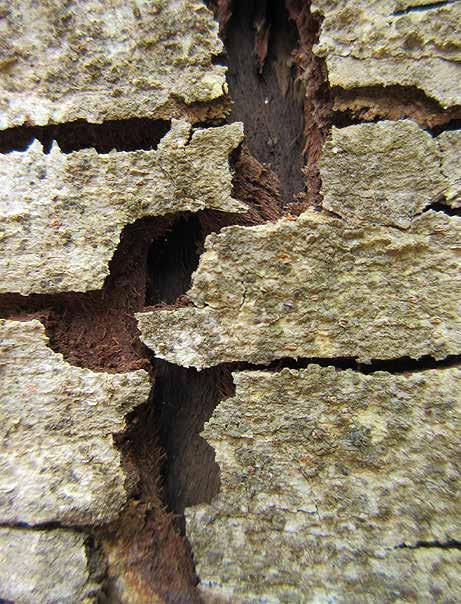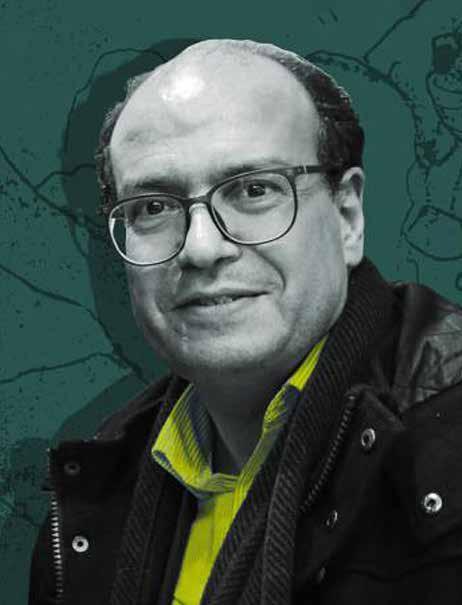
9 minute read
The men I love
I always take the men I love To the same places And make them sit on the same chairs And I choose the same food for them I want without feeling
To introduce them to each other
Advertisement
An affectionate grandmother wraps her arms around her granddaughter’s neck
Do you feel pity for me?
When the teacher slapped me
And she said that I did not find anyone to raise me
I remembered you at once
And I cried
Not from the slap
But because she said what you always tell me
Although you know
The hand that made me
And put me on fire a lot
To become in this state
Your hand
Do you feel pity for me?
I see our picture together
Almost normal for those who do not know us:
An affectionate grandmother wrapped her arms
On the neck of her granddaughter, who lost her parents early
But for me:
A grandmother slowly strangles her granddaughter
Or a granddaughter hangs herself
With her grandmother’s arms
Do you feel pity for me?
I failed a lot in love And at work
And in making friends
Failed to make a meal for two
Failed to walk in high heels
And in choosing clothes that keep pace with fashion
Failed to have a normal smile..
And a less severe gaze
Failed and failed and failed But I never failed To hate you..
Your voice
I love your voice, because it reminds me of the door of our old home The door that smells like orange Your voice smells the same
Your voice makes me reassured that this door will never die And it will surely know my way And come to me.
I need your voice because I live in a house without doors I need a door to get out of

Essam Khalifa (1971) is an Egyptian Canadian poet who obtained his first degree in Medicine in 1994 and his M.A. in Business Administration in 2011.He has published more than five poetry anthologies, two of them have been translated and published in Spanish , in addition to a book in the field of human resources development. He attended and participated in many poetry festivals around the world and his books have been circulated around the Arab area. He won the second position in Prince of Poet competition reward - Emirate – 2015.
Orchid flower
Rest
Do not be afraid of me today
They may cross like a glance
Like a flash of lightning when my eyes see it They did not carry my heartbeats in their veins
They did not shed tears when I was sad
They did not dance over the madness of my strings and melodies
They did not grow in the depths of my memory and my art
So rest
I am no longer like a bird that harried towards flowers that mimic their shape in every corner
As similarity
Among the jasmine blossoms arouses my rejection And matching became my problem and my prison
For how many flowers, from a distance, decorated the chest of spring if it is beautiful
Suggesting that the face of beauty is coming from near In its monotony, beauty dies, exiled and is defenseless I scream into her mirrors and ask:
Who will revive the renewal revolution, who will come to carry In her hands the rarity of the orchid or the charm of the carnation
I got lost in search of myths of imagination
About women who dressed frankness
Not beautification
About a conversation that did not resemble what was said yesterday or what was said first
Orchid flower contd...
About a free and unfettered spring
About flowers that did not repeat me and suffocate me and kill me And ,then, I met you
As I found a beautiful orchid spinning Spectrum from the threads of dawn That makes the rising more beautiful Then I realized that my desired spring is coming To remove the snow from me.
Orchid, be tender And rest on my bough And dress my security in fear And grow between me and me And rest
No flower is like you
No greenery, no plant That grew up in the field of imagination Or wishing groves.
Oh girl who hurt my heart and my mind In my question
About the intentions of the mobile phone
Whenever I swear that Every time I teach her not to suspect
For some suspicion in some cases is a sin, She followed me
This suspicion is love; do not leave me I burn from the fire of my feelings and thoughts
Oh my peace midst my worries
Oh my stillness
In a noise that could not help
Oh, a dialogue that came whispering
Like a harp that Soliloquizes the silence of my night
Like a flute when it regurgitates a tune
Gathering moons around me
Like a brush that mimics the painter’s vision of me
It traveled from his hands
And picked my color from the palette
Oh you, a feeling formulated from me
Oh you, intelligence that did not betray me
That disappear when love describes my say
Be my support in expression and singing
Be my rhyme and meter in creativity
And save me from letters that did not describe me
From the seas that drowned me
From ports that did not rescue me
Of meanings I have written and I do not know
In the concepts of passion, what does it mean?
Pass like a torrent in the desert of my bosom
Destroy the walls of my fortress
And enter without my permission
Orchid flower contd...
I lived my life like a train
Hating my waiting time
Refusing to feel my cowardice
Fleeing from all patience that may be sweeten with hope
Seeking help, my God help me
On the path
Towards fire or bliss that did not water me
I cannot bear patience as my companion
This was what happened to me
A liar who claims to be safe
In less speed.
Rest
They did not read my poetry before my ink touched it
They did not shine the night of my solitude as the dawn prayer
They did not taste the bitterness of my volatility and impatience
They did not accept, despite the guilt, my excuse So settle
And drink from the water of my feelings and rejoice
Here where my heart resides
Here I deposited my secret
Here I will live from my cradle to my grave
So be quiet and dwell in the warmth of my chest
Rest
I am no longer like bees quenching my nectar from the blossoms I am not used to living from my rejection and stubbornness
This is how I made my covenant
This is how I became mine
O stillness of the sea, O River of paradise
O girl, whenever I burdened her with a load, she answered “O beloved of the heart from my eyes and my eyes”
Do not be afraid or slow down
In my country, you will not get lost
This is my compass, and that path is my path, so go through it
And remember what I said, if you did
That is my heart
Purify it
From the remnants of its inhabitants Decorate it with your own color granted from me And dance and sing in it.

Faris Khader (1969) is an Egyptian poet. He has published four poetry collections. He works as Deputy Editor-in-Chief of Radio and Television Magazine and the Editor-in-Chief of the Egyptian Poetry Magazine (2007-2017). He holds a PhD in Philosophy of Folk Arts (specializing in folk customs and beliefs), from the Academy of Arts. He has published folkloric studies, including: The Inheritance of Sorrow, Perceptions of Death in the Popular Consciousness, Enchanted Cities: Bridging the Distance between Heaven and Earth, and The Night Vigil: 100 Folk Tales from the Dakhla Oasis.
A crippling guide
(He knows nothing of his desert except the abyss)
I cannot find anything that indicates me Only my pain
O head of wisdom and foolishness You have not read my chapter Or caught my fire... ever But you know the way
My hand squeezed in your knowing hand And my steps are more ignorant than a sacrifice That walks towards the slaughterhouse
I walk against your wind Fascinated by old singing And I do not follow the gallows Over your walls
So that I do not suffer Again Thus
You left me in a semicircle And you said: All roads lead to the abyss
If you pointed to the edge of a mountain, I would have walked I am the blind I took my share of the dark And your crutch that was eaten by licorice
Crucified me in the wind continued overleaf...
© Faris Khader
A crippling guide contd...
if …
If you bequeathed me cruelty
I would not cross this forest barefoot And I would have taken the thorns out of my throat And released my cry
And I would live near my wild plant To watch my sadness When it drinks my rain And sleeps under my cloud.
I would Be pleased to be A tear No warrior sheds On his rifle.
Sycamore
Took off its feet
At my waist
And shared the houses their grief
The baker of legends I feed you..
And the pebbles crackle on the fire
For my hungry child to sleep.
Gendarmerie guard
I distribute sleep on the eyelids
And the terror waters its tall tree.
The cry of the flute When it blows the smoke off After the wars finished their music And the earth was filled with blood
Just If.. you bequeathed me cruelty..
I left my palm
Hanged on the pillars of the shrine And the intercession is spoiled On the feet of the sectarians
This is my fault..
The crime that I do not know what it is So I flee from my shadow And I do not gain from my successive breaths Except punishment
With fingers touching life When it runs to its burrows..
With a mouth As a tank
That distributes its missiles fairly continued overleaf...
A crippling guide contd...
With an enemy In the goal Bemoaning the wasted ammunition.
By step That do not cross the road Except to an abyss..
With my scorched blood And the scent of my limbs on embers,
I eat my body.. And die hungry.


Gerges Shoukry (1967) is an Egyptian poet and theater critic for Radio and Television magazine since 1994.He published nearly six poetry anthologies. His poems have been translated into German, English, French, Swedish, Dutch, Catalan, Slovenian and Hungarian. He also published five books in theatrical criticism and a book in travel literature. He won many national awards on his poetic, theatrical and critical achievements.
Jacket
My jacket and I go for winter walks I entrust it with keeping my cigarettes And we do not ask anyone about the way I hold it in my hand when the world suffocates And sometimes it jumps onto my shoulder
Like a cat when longing overcomes it
So it bits my hands in her pockets
And I smile reassuringly
My jacket is faded and the street is noisy
Despite this, it insists on exiting
And when I get spoiled, it pushes me hard
So I carry it and do not talk to anyone
My jacket loves the street as much as I do
And I do not know how this love was born
I do not remember where this jacket came from Only when I hate the world
I hide in my jacket
So it walks alone... It does not talk to anyone.
The national anthem
We are the knives
We have screaming blades And our handles are dead
We know we are slaughtering and tearing apart And do not be deceived by the love of butchers
We smile at the sacrifice while it is in pain
So do not hate us
We are the infidel knives
With all love
We were created like this without hearts
They put our feelings to a sharp blade
And the blacksmith recommended us
To slay vigorously
So as not to die.
Do not hate us when we slaughter you
We do not know pain
Also, we do not cry
We just slaughter
The sharp blade rises high Without fear.
The hammer
The hammer said: Why do I beat my brothers like this? And it looked at the blacksmith in weariness
He got angry and said:
To be swords tearing the hearts of enemies Blades that slaughter those who are bored Many things.
Your brethren, you fool, are a code of life Then he tossed it away and went furious
Days passed and the hammer was sad And its brothers got sick with rust
One evening the blacksmith did not return home
Passers-by heard an enchanting rhythm flowing from his shop
Things dance and then repeat the rhythm for days
So sleep abandoned the city and the affliction intensified
As the slaughter machines abstained from killing their brothers
Of animals and birds
And the other machines refused to do their work
And whenever a blacksmith is absent and they open his shop
They found him sprawled like a sword, and a smiling hammer beside him

Hassan Najmi (1960, Ibn Ahmed, Settat province) is a Moroccan poet, author, and journalist. He was The President of the Union of Writers of Morocco between 1998 and 2005 and former head of the House of Poetry in Morocco. He is also the President of the Moroccan Center for the International PEN Club and Secretary General of the Argana Prize for Poetry. He founded the House of Poetry in Morocco, along with a group of Moroccan poets (December 1995) and was elected vice-president and spokesperson for the House. He received many Arab and international awards, and his works have been translated into more than ten languages. He has also translated into Arabic the poetic works of a number of the world’s leading poets.



